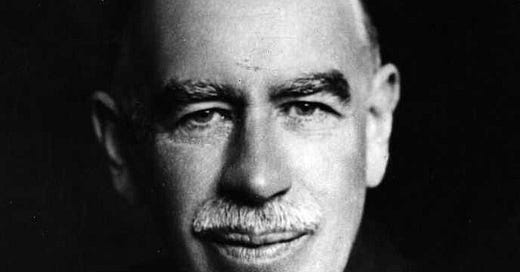What would Keynes think?
It would be fair to say that Keynes, who saw money as a means to a more fulfilling life, would find our current era disconcerting, a culture of means without ends.
The love of money as a possession-as distinguished from the love of money as a means to the enjoyments and realities of life will be recognised for what it is: somewhat disgusting morbidity, one of those semi-criminal, semi-pathological propensities which one hands over with a shudder to the specialists in mental disease. John Maynard Keynes
In the age of money, where the value of everything is quantified in dollars and cents, we find ourselves navigating a maze of economic uncertainty. A pervading gloom overshadows our collective consciousness as predictions paint a picture of a future blighted by climate change, low population growth, and the possibility of war. Any of these threats would lead to stagnant economic growth and declining prosperity.
These modern-day fears echo those voiced by prominent economist John Maynard (Lord) Keynes following WWI and the harrowing years of the Great Depression. Keynes recommended austerity during boom times of economic growth ("The time to tighten your belt is when you are fat and happy"). Government borrowing and spending are for busts when the economy is sinking. Alas, Keynes' ideas of how and when governments should intervene in the economy are commonly ignored in the booms and only followed when the economy is struggling. At such times, politicians borrow and spend liberally, claiming they are simply following Keynes's recommendations. As Nobel laureate Robert Lucas aptly put it, "Everyone is a Keynesian in a foxhole."
Keynes' economic ideas were more complex than our politicians would have us believe. After a meeting with leaders in America, Keynes joked that he was the only one in the room who was not a Keynesian—an elegant rebuke to the posturing of bloviating politicians.
Keynes viewed economics as an intricate blend of mathematics, psychology, history, and philosophy rather than a mere numbers game. Regrettably, in the modern context, the philosophical aspects of his thinking get overlooked, skewing our comprehension of his economic ideas. Keynes passionately argued that economic theories should be about more than simply spending money. He believed that all government economic programs should be evaluated within the broader framework of human needs, societal constructs, and desires.
Freudian psychology exerted a strong influence on Keynes's understanding of human behaviour. He deviated from the standard economic practice of considering people to be rational decision-makers and adopted Freud's idea that "animal spirits" drive all human behaviour. Keynes believed that investors, much like a herd, are influenced by cycles of greed and fear, often leading to economic highs and lows. According to Keynes, this cyclical pattern stems from our psychology, innate uncertainties and fears.
Keynes critiqued the fixation on wealth accumulation for its own sake as a demonstration of human irrationality. It is not that he despised money (he made a lot of it ), but he did not see money as an end but a means to achieve human flourishing. In his "General Theory," Keynes stated, "The day is not far off when the economic problem [scarcity] will take the back seat where it belongs, and the arena of the heart and the head will be occupied or reoccupied, by our real problems—the problems of life and human relations, of creation and behaviour and religion."
Alas, we've deviated a long way from Keynes's philosophy. Wealth accumulation has taken centre stage. Once a haven for the growth of the human spirit, the arts and humanities have become commodities. Universities, symphony orchestras, and even libraries publish fatuous "economic impact" studies to demonstrate their value.
Measuring everything in terms of finance leads to crass calculations. A recent Australian TV news show noted that the nation could save billions of dollars by eliminating domestic violence. Is this really the reason to combat violence? Do we have children so that they can become consumers and stimulate the economy? Are marriages good because spending on weddings, rings and honeymoons increases the GDP? It would be fair to say that Keynes, who saw money as a means to a more fulfilling life, would find our current era disconcerting, a culture of means without ends.
Keynes would also despise our current inflation: "By a continuing process of inflation, governments can confiscate, secretly and unobserved, an important part of the wealth of their citizens." His insights into the destructive effects of inflation underpin today's central banking policies but not our government's self-destructive expansionist fiscal policies.
As we navigate critical junctures, Keynes's teachings encourage a balanced view, considering economics to reflect human behaviour, societal norms, and broader philosophical concerns. It is an excellent time to revisit Keynesian principles to ensure the pursuit of both means and ends that contribute to a more fulfilling life for all of us.
(An earlier version of this article appeared in the Canberra Times.)





Yep. A statesman cares about the next generation. A politician about the next election.
Pardon the pun, but this is “on the money”. If government deficits are out of control in “normal” let alone “good” times (low unemployment, etc) then the ability to step them up as required in the bad ones is heavily constrained.